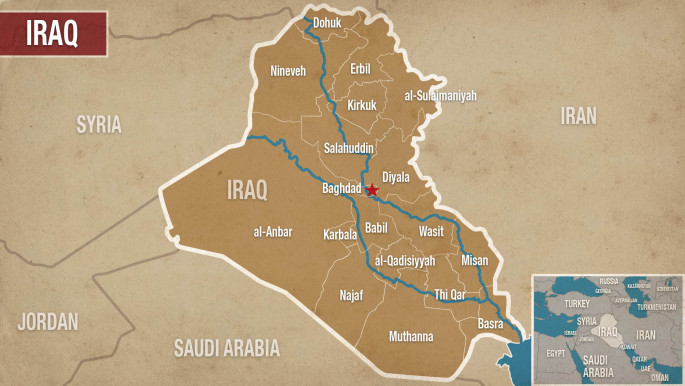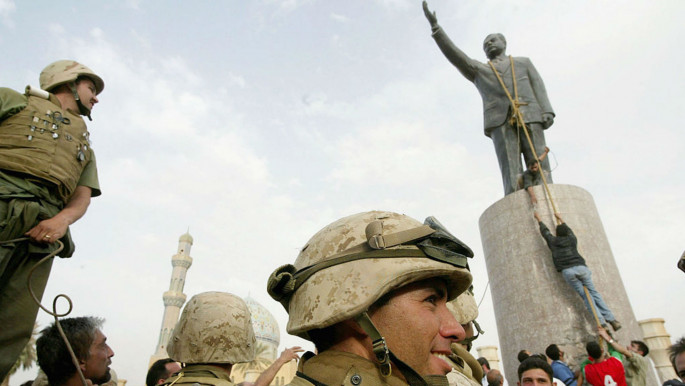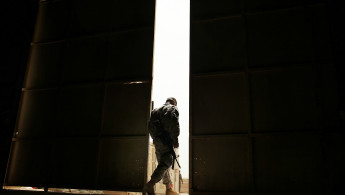Detrimental or beneficial: The status of foreign troops in Iraq
"US military presence in Iraq is detrimental to countries and nations of the region. You should take action to make the US withdraw its troops from Iraq because wherever they have had [an] enduring presence, forcing them out has become problematic," he told the Iraqi premier.
Abdul-Mahdi's visit to Tehran comes just a month after Iranian President Hassan Rouhani's first ever state visit to Baghdad. Iran is clearly trying to enhance and expand its ties with neighbouring Iraq.
The US has over 5,000 troops currently based in Iraq, who were deployed there in recent years to help Baghdad destroy the Islamic State group [IS].
In recent months, however, talk in Iraq about removing these troops has increased, largely as a result of two actions by US President Donald Trump.
The first was Trump's unannounced trip to meet US troops in Iraq's western al-Asad airbase. He did not meet either the prime minister or Iraqi officials. Consequently, his action was lambasted by Iraqi members of parliament, some of whom went so far as to deem it a direct violation of the country's sovereignty.
Then, in February, Trump said that the US troop presence will remain in Iraq to watch Iran. That comment proved even more controversial in Baghdad. US officials quickly tried to downplay Trump's actions and comments to minimise the damage. Baghdad only authorises the US troop presence on its soil to help it against IS.
Iran has significant clout in Iraq through local leaders. Large segments of the Iraqi Shia-majority Popular Mobilization Units [PMU] paramilitaries are loyal to Iran and share its many of its interests and objectives in Iraq.
Read also: The Iraq Report: Millions of Iraqi children abandoned or orphaned
During the war against IS, Qasem Soleimani, the head of Iran's Islamic Revolutionary Guard Corps [IRGC] extraterritorial Quds Force, directly commanded many of these Iraqi fighters in battles against IS.
 |
The US has over 5,000 troops currently based in Iraq, who were deployed there in recent years to help Baghdad destroy the Islamic State group |  |
During the last parliamentary elections in Iraq, in May 2018, more Iraqis voted for Muqtada al-Sadr's list than Hadi Al-Amiri's, since the latter is aligned with Iran and favours its continued presence via local proxies in the country. The results of that election showed just how divided Iraqis are over the role Tehran plays in their country's affairs. Furthermore, the status of different forces in Iraq has often divided Iraqis and their representatives.
 |
|
In late March, Iraq's President Barham Salih told The Associated Press that there is a "general consensus" that Baghdad needs the US to continuously combat the IS threat. Once the US presence is for that ad-hoc purpose of assisting and training Iraqi forces Salih does not believe there will be a serious effort in Baghdad to have US troops removed.
Notably, Salih also said that Turkish troops in the country should withdraw, arguing that their presence prevents Baghdad from further developing relations with Ankara.
The status of foreign troops in Iraq has intermittently come up in the years after the Iraq War. Turkey has had a troop presence in a series of forward operating bases in Iraqi Kurdistan since the 1990s, primarily in order to combat the Kurdistan Workers' Party (PKK) group there.
In December 2015, when Turkey sent additional troops to its training camp in the Nineveh province town of Bashiqa, near Mosul, arguing that they were necessary to defend it against IS, it was bitterly denounced by Baghdad. The dispute over the Turkish presence in Iraq continued for about a year reaching its peak in the fall of 2016.
 |
The results of that election showed just how divided Iraqis are over the role Tehran plays in their country's affairs |  |
Turkish President Recep Tayyip Erdogan directly insulted then Iraqi Prime Minister Haider al-Abadi after the Iraqi parliament called on Turkey to withdraw its troops.
"You first know your place," Erdogan said of Abadi. "You are not my interlocutor, you are not of the same quality like me, you are not my equivalent, you are not at my level."
 |
|
| Read also: America's delusions in Baghdad cost Iraqis their sovereignty |
The Turkish president went on to add that his country would intervene in Iraq if it wanted since the "Turkish Army has not come down to the level of taking orders from you."
Despite claiming it would regardless of Iraq's objections, Turkey ultimately did not participate in the Mosul operation against IS, which began in October 2016, and relations between the two sides have since substantially cooled. Turkey is currently reopening its consulates in both Mosul and Basra.
While many Iraqis oppose any foreign troop presence in their country their leaders have often proven more selective about which ones they oppose and which ones they support.
Amiri, for example, toes Iran's line in Iraq and opposes the US troop presence in the country. If it came to a vote in parliament to remove them he would likely support it. He would not, however, take similar action against Iran's role in the country given the close alignment, both current and historic, between his Badr Organization and Tehran.
Iraqi Kurdistan has long advocated for a continued US presence in Iraq, insisting that it's essential to combat any potential IS resurgence. For many decades, Iraqi Kurds have long favoured a US troop presence in the country since they see it as directly beneficial for their own security. As early as 1993, the Iraqi Kurdish leadership even said they would welcome the establishment of American bases in their region.
 |
Iraqi Kurdistan has long advocated for a continued US presence in Iraq, insisting that it's essential to combat any potential IS resurgence |  |
Iraqi Kurds oppose any Iraqi military deployment in their region. The Iraqi military hasn't had a major military presence in Kurdistan since the aftermath of the 1991 Persian Gulf War.
In 2012, former Iraqi Prime Minister Nouri al-Maliki insisted he had the right not only to deploy the Iraqi Army in disputed territories between Baghdad and Erbil, most notably Kirkuk, but also in Kurdistan's heartland provinces. This created tensions and even led to a brief standoff between the Iraqi Army and the Kurdish Peshmerga.
During that tense period, Maliki slammed the autonomous region, arguing that Iraqi federal forces had more of a right to have an armed presence there than the Turkish military does.
Perhaps the only prominent Iraqi leader who has been consistent on his stance on foreign troops in Iraq has been Sadr. In his Initial Solutions proposal in 2017, Sadr called for the expulsion of both "occupying and even friendly forces from Iraqi territory." This included US and Turkish troops, Iranian elements and even non-Kurdish Peshmerga who fought with the group during the war against IS. Sadr also called for the dissolution of the PMU.
While many elements of this initiative were opposed in Iraq such clear consistently on his part was likely one reason why so many Iraqis voted for his list.
Ultimately, the debate over which states can base troops in Iraq will likely continue for many more years, if not decades, to come.
Paul Iddon is a freelance journalist based in Erbil, Iraqi Kurdistan, who writes about Middle East affairs.
Follow him on Twitter: @PaulIddon



